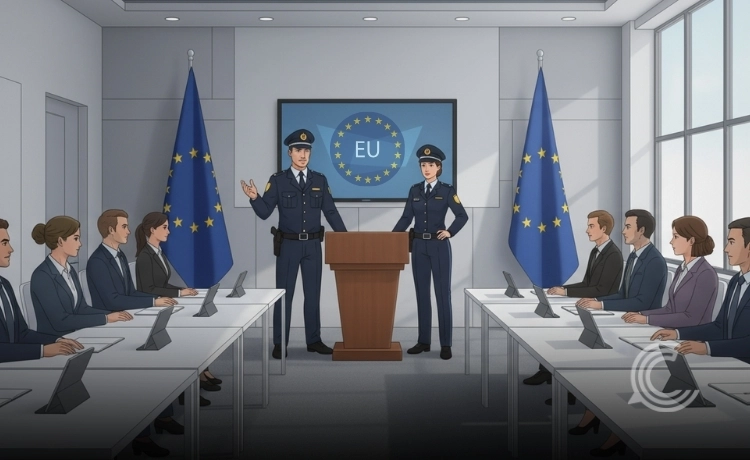EU Plans Large-Scale Training Program for 3,000 Gaza Officers

Key Highlights–
- EU foreign ministers to debate a proposal to train 3,000 Palestinian officers from the Gaza Strip.
- The plan aligns with the first phase of a US-led 20-point roadmap for Gaza’s stabilisation.
- A rival Russian draft resolution at the UN draws attention to deep geopolitical divisions over Gaza’s future.
The European Union is examining whether it can take a central role in training 3,000 Palestinian officers from Gaza under a proposal to be discussed by foreign ministers next week, according to a document seen by Reuters. The move marks one of the bloc’s most significant potential security engagements in the region in years.
EU Considers Lead Role in Training Palestinian Officers
The paper prepared by the European External Action Service (EEAS) outlines options for how the EU could support the implementation of a 20-point Gaza plan proposed by U.S. President Donald Trump.
Israel and Hamas agreed in October to the first phase of the US-brokered framework, but the future of subsequent stages remains uncertain amid persistent political and security tensions.
A Step Toward Stabilisation If Political Conditions Allow
According to the EEAS analysis cited by Reuters, the EU is weighing whether its existing police support mission in the West Bank can expand to take “leadership in training the Palestinian police force in Gaza.” This initiative would commence with direct training for 3,000 Palestinian officers on the Palestinian Authority’s payroll, with an eventual target of preparing all 13,000 officers envisaged for Gaza’s policing structure.
EU officials argue that strengthening a locally accepted police force is critical to stabilising the territory once ceasefire conditions hold. Furthermore, the proposal would also complement the bloc’s border assistance mission, which currently helps monitor the Rafah crossing. Under the new plan, that mandate could expand to “other strategic border points.”
However, diplomats acknowledge that the plan is fragile, since there is a deep mistrust between Israel and the Palestinian Authority. Hamas is still holding influence on the ground; meanwhile, with conflicted nations- the US and Russia still manoeuvring at the UN, the political space for a large-scale EU mission remains narrow.
Geopolitical Tensions Complicate EU’s Path
The EU’s deliberations come just as Russia submitted its own draft UN Security Council resolution on Gaza, directly challenging the US efforts to standardise Trump’s roadmap. According to Reuters, Moscow’s counter-proposal signals its desire to shape the post-conflict order, complicating Western plans and adding another layer of uncertainty for any EU-led training mission.
European diplomats say the competing drafts highlight the need for the bloc to develop its own coherent strategy. “If the US and Russia continue to clash over Gaza’s future, the EU cannot afford to be a passive actor,” one official told a leading news agency in the report.
How Other Nations Have Trained Foreign Police Forces
The EU’s consideration of training Palestinian officers showcases a long global pattern of countries stepping in to rebuild policing systems elsewhere, especially in conflict zones.
The US has led some of the largest such programs in modern history, overseeing the training of tens of thousands of police personnel in Iraq and Afghanistan. The EU’s post-war missions in Kosovo and Bosnia remain among its most significant civilian deployments. Beyond Europe, countries like Turkey have spent more than a decade helping train Somali police forces to counter insurgency threats.
In the Pacific, Australia and New Zealand regularly train police from Papua New Guinea, the Solomon Islands, and Vanuatu. Meanwhile, the UK has supported Ukrainian police since 2014 through training in community policing and corruption prevention.
Additionally, the United Nations routinely trains police forces in fragile states such as Haiti, South Sudan, Timor-Leste, and Liberia as part of its peacekeeping and stabilisation efforts.
Collectively, these precedents demonstrate that international police training is not exceptional but rather a widely used foreign policy tool, positioning the EU’s plan for Palestinian officers as part of a broader, well-established global practice.



